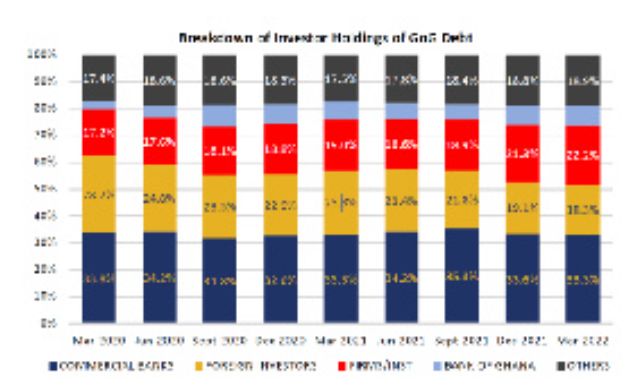Tax commercial churches and scrap taxes on sanitary products – EAI to government

William Boadi, the Executive Director of Educate Africa Institute (EAI), has petitioned the government to tax commercial churches and scrap taxes on sanitary products.
The petition addresses two critical issues, the taxation of churches engaging in commercial activities and the imposition of taxes on sanitary pads.
According to him, as of March 15, 2024, Ghana reportedly boasts of over 3,500 churches, many of which are involved in profit-making ventures such as consultancy services and the sale of beverages like Sobolo, marketed as symbolic of religious significance.
He explained in an open letter to the government that despite these lucrative activities, churches have managed to evade taxation, depriving the government of revenue for development initiatives.
William Boadi, speaking on behalf of concerned citizens, emphasized the necessity of holding religious institutions accountable for their commercial operations.
“We, the undersigned citizens of Ghana, write to you with a plea for fairness and justice in our nation’s taxation policies.
“As of March 15, 2024, there are reportedly 3511 churches operating within our borders, many of which engage in commercial activities such as consultations for a fee and the sale of local drinks like Sobolo, often marketed as symbolic of Jesus’s blood. Despite these profitable ventures, these churches evade taxation, depriving our government of much-needed revenue for development initiatives,” part of the latter said.
Boadi contends that fair taxation policies for churches would ensure their equitable contribution to national development efforts.
The petition also raises alarm over the government’s decision to tax sanitary pads, essential products for women’s health and hygiene. Describing menstruation as a natural biological process, Boadi argues that taxing sanitary pads places an unjust financial burden on women, particularly disadvantaged groups who struggle to afford these necessities.
“Furthermore, we are deeply troubled by the government’s decision to impose taxes on sanitary pads, essential products for women’s health and hygiene. Menstruation is a natural biological occurrence, not a luxury or a business opportunity.
“Yet, by taxing sanitary pads, the government places an unfair financial burden on women, particularly unemployed young women, who struggle to afford these necessities. This economic strain contributes to widespread challenges such as teenage pregnancies, perpetuating cycles of poverty and inequality,” the letter added.
Read the full statement below:
We, the undersigned citizens of Ghana, write to you with a plea for fairness and justice in our nation’s taxation policies. As of March 15, 2024, there are reportedly 3511 churches operating within our borders, many of which engage in commercial activities such as consultations for a fee and the sale of local drinks like Sobolo, often marketed as symbolic of Jesus’s blood. Despite these profitable ventures, these churches evade taxation, depriving our government of much-needed revenue for development initiatives.
Furthermore, we are deeply troubled by the government’s decision to impose taxes on sanitary pads, essential products for women’s health and hygiene. Menstruation is a natural biological occurrence, not a luxury or a business opportunity. Yet, by taxing sanitary pads, the government places an unfair financial burden on women, particularly unemployed young women, who struggle to afford these necessities. This economic strain contributes to widespread challenges such as teenage pregnancies, perpetuating cycles of poverty and inequality.
We urgently call upon the government to take the following actions:
1. Taxation of Churches: It is high time for churches and religious institutions to be held accountable for their commercial activities. By engaging in consultations for profit and selling beverages like Sobolo without contributing taxes, these establishments are exploiting loopholes in our taxation system. Implementing fair taxation policies for churches would ensure that they contribute their fair share to national development efforts.
2. Removal of Taxes on Sanitary Pads: Menstrual hygiene products are essential for women’s health and well-being. Taxing these products not only exacerbates gender inequalities but also undermines efforts to promote women’s health and dignity. Removing taxes on sanitary pads is a crucial step toward ensuring menstrual equity and alleviating the financial burden on women, particularly those who are unemployed or economically disadvantaged.
3. Addressing Socioeconomic Impacts: The intersectionality of taxation policies and social issues cannot be ignored. High taxes on sanitary pads disproportionately affect women’s access to education, employment, and health care, perpetuating cycles of poverty and inequality. By implementing fair taxation policies and investing in menstrual health education and accessibility programs, the government can empower women and promote gender equality.
In conclusion, we urge the government of Ghana to prioritize fairness, equity, and justice in its taxation policies by taxing churches appropriately and scrapping taxes on sanitary pads. These measures are essential for building a more equitable society where all citizens have equal access to the resources and support they need to thrive.
We stand united in our call for action, and we implore the government to heed our petition for the betterment of our nation and its people.
Sincerely,
William Boadi
Executive Director of Educate Africa Institute (EAI) and Educationist.
Source: www.ghanaweb.com





